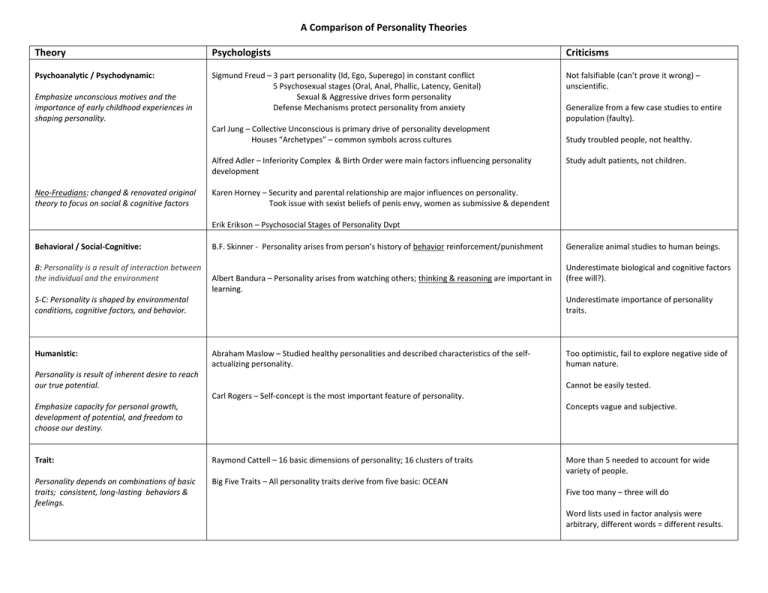Personality Theories Comparison: Freud, Jung, and More
advertisement

A Comparison of Personality Theories Theory Psychologists Criticisms Psychoanalytic / Psychodynamic: Sigmund Freud – 3 part personality (Id, Ego, Superego) in constant conflict 5 Psychosexual stages (Oral, Anal, Phallic, Latency, Genital) Sexual & Aggressive drives form personality Defense Mechanisms protect personality from anxiety Not falsifiable (can’t prove it wrong) – unscientific. Emphasize unconscious motives and the importance of early childhood experiences in shaping personality. Carl Jung – Collective Unconscious is primary drive of personality development Houses “Archetypes” – common symbols across cultures Alfred Adler – Inferiority Complex & Birth Order were main factors influencing personality development Neo-Freudians: changed & renovated original theory to focus on social & cognitive factors Generalize from a few case studies to entire population (faulty). Study troubled people, not healthy. Study adult patients, not children. Karen Horney – Security and parental relationship are major influences on personality. Took issue with sexist beliefs of penis envy, women as submissive & dependent Erik Erikson – Psychosocial Stages of Personality Dvpt Behavioral / Social-Cognitive: B: Personality is a result of interaction between the individual and the environment B.F. Skinner - Personality arises from person’s history of behavior reinforcement/punishment Albert Bandura – Personality arises from watching others; thinking & reasoning are important in learning. S-C: Personality is shaped by environmental conditions, cognitive factors, and behavior. Humanistic: Generalize animal studies to human beings. Underestimate biological and cognitive factors (free will?). Underestimate importance of personality traits. Abraham Maslow – Studied healthy personalities and described characteristics of the selfactualizing personality. Personality is result of inherent desire to reach our true potential. Too optimistic, fail to explore negative side of human nature. Cannot be easily tested. Carl Rogers – Self-concept is the most important feature of personality. Emphasize capacity for personal growth, development of potential, and freedom to choose our destiny. Concepts vague and subjective. Trait: Raymond Cattell – 16 basic dimensions of personality; 16 clusters of traits Personality depends on combinations of basic traits; consistent, long-lasting behaviors & feelings. Big Five Traits – All personality traits derive from five basic: OCEAN More than 5 needed to account for wide variety of people. Five too many – three will do Word lists used in factor analysis were arbitrary, different words = different results.



